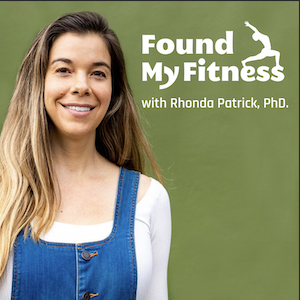Sauna use, depression and addiction — the dynorphin thermoregulatory connection | Roland Griffiths
Get the full length version of this episode as a podcast.
This episode will make a great companion for a long drive.
The Omega-3 Supplementation Guide
A blueprint for choosing the right fish oil supplement — filled with specific recommendations, guidelines for interpreting testing data, and dosage protocols.
The body produces an opioid called dynorphin, which is generally responsible for dysphoria, a profound sense of unease or dissatisfaction. The binding of dynorphin to kappa-opioid receptors triggers cellular events that promote pain and distress. Sauna use promotes dynorphin release, which may be responsible for the general sense of discomfort experienced during heat exposure. Interestingly, in a biological feedback response that occurs after dynorphin binds to the kappa-opioid receptor, the brain produces more mu-opioid receptors, sensitizing them to endorphin and future endorphin exposure, a process known as the Salvinorin A pathway. As such, sauna use has potential as a means to treat depression and opioid addiction. In this clip, Dr. Rhonda Patrick describes how sauna use activates the Salvinorin A pathway, potentially ameliorating symptoms of depression and opioid addiction.
Rhonda: I know you've done a little bit of work on Salvinorin A, and it's not something I'm so familiar with so much as the kappa-opioid pathway. A good friend of mine, Sheba Meucci [SP], had told me a little bit about the Salvinorin A pathway. He was doing some literature reading on it some years ago for whatever reason, and so how it came into my awareness. And he was telling me about how agonism of the kappa-opioid receptor had a feedback loop effect where it actually caused mu-opioid receptors which bind to beta-endorphins to become more sensitized to the endorphins.
And so I read up on this, checked the literature and references, and found that indeed the agonism of it does actually cause mu-opioid receptors to become sensitized to endorphins and I thought that was very interesting. Around the same time, I started getting into using the sauna, so heat stress. And I started to notice...so when I was in graduate school, I was very stressed out, lots of pressure, failed experiments, and exams. And so I started using the sauna a lot before I'd go into the lab and I noticed that there was a very profound effect on my brain because I started to be able to handle stress better. My anxiety was lower. I felt good, and these were lasting effects. I felt good days later.
And so I started reading about what's going on here. I started reading about heat stress, and I came across the dynorphin pathway which is an endogenous opioid that we make in our brains, sort of the counter to endorphin because it sort of makes you feel dysphoric rather than euphoric. And then I started reading about how dynorphin actually is a part of the...both endorphin and dynorphin are part of the thermoregulatory pathway. So dynorphin actually cools the body down. And when your body heats up, you increase dynorphin to cool it down. It's sort of a response mechanism.
So when you're sitting in a hot sauna or when you're working out really vigorously and you feel that sort of uncomfortable heat where you're like, "Oh, I want to stop. I feel..." I think that's probably dynorphin. So dynorphin binds to the kappa-opioid receptor which then sensitizes the mu-opioid receptors. So now, I was thinking, well, maybe some of these lasting effects from the sauna were mediated through that. Of course, that's all anecdotal. I mean, I know some of the biochemistry is out there, but I don't know if that's necessarily been shown, but that's how I became really interested in that pathway, my sort of personal story.
And then I started reading somewhere, someone sent me some article about people that were addicted to...I think it was opioid, prescription opioid. They were being treated by giving them the sauna as a detox, "detox," which I don't know if that's actually legitimate. But I started thinking about possible, maybe there's some truth to it by resetting the mu-opioid receptor pathway or something. So I just thought that was something very interesting that maybe I could send you some of the studies if you're interested in seeing some of those.
Roland: Yeah, yeah. I'd be interested in that.
A hormone produced in the brain that blocks the sensation of pain. Beta-endorphin is released in response to a wide range of painful stimuli and stressors, including heat.[1] Beta-endorphin exhibits morphine-like activity, but its effects are up to 33-times more potent than morphine.[2] Both morphine and beta-endorphin act on the μ-opioid receptor.
- ^ Jezová D; Vigas M; Tatár P; Jurcovicová J; Palát M (1985). Rise in plasma beta-endorphin and ACTH in response to hyperthermia in sauna. Horm Metab Res 17, 12.
- ^ 10.1073/pnas.73.8.2895
A potent endogenous opioid peptide. Dynorphin acts on the kappa-opioid receptor and is associated with a transient feeling of dysphoria. It has many different physiological actions, depending upon its site of production, and is involved in addiction, temperature regulation, appetite, circadian rhythm, pain, stress, and depression. Dynorphin may also be involved in the body’s thermoregulatory response to hyperthermia.[1]
One of four related receptors that bind opioid-like compounds in the brain. Opioid receptors are responsible for mediating the effects of these compounds, which including altering pain, consciousness, motor control, mood, stress, and addiction. Agonism of this receptor produces a transient feeling of dysphoria but also causes an upregulation and sensitization of mu opioid receptors, which interact with beta-endorphin.
Salvinorin A is the main active psychotropic molecule in Salvia divinorum, a Mexican plant which has a long history of use as an entheogen by indigenous Mazatec shamans. Salvinorin A can produce psychoactive experiences in humans with a typical duration of action being several minutes to an hour or so. It is structurally distinct from other naturally occurring hallucinogens, acting on the k-opioid receptor instead of the 5-HT2A (serotonin) receptor.
A protein responsible for mediating the effects of agonists such as morphine and beta-endorphin. μ-opioid receptors are involved in the body’s thermoregulatory response to hypothermia.[1]
- ^ Patrick, Rhonda P.; Johnson, Teresa L. (2021). Sauna Use As A Lifestyle Practice To Extend Healthspan Experimental Gerontology 154, .
Member only extras:
Learn more about the advantages of a premium membership by clicking below.
Get email updates with the latest curated healthspan research
Support our work

Every other week premium members receive a special edition newsletter that summarizes all of the latest healthspan research.
Psychedelic News
- Microdosing psychedelics may assist people in making health-related behavior changes.
- Psilocybin, a compound in psychedelic mushrooms, extends cellular lifespan by up to 57% and promotes healthy aging in mice, implying potential anti-aging benefits.
- Depression symptoms dropped markedly after one 25-milligram psilocybin dose in a study of people with severe treatment-resistant depression.
- Psilocybin from 'magic' mushrooms offers comparable or enhanced depression relief over traditional SSRIs, improving social functioning and life meaning.
- Older adults who used psychedelics exhibited better cognitive function and fewer depressive symptoms than non-users.





